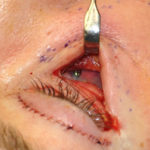The most common complication of facial implant surgery (such as a cheek or chin implants) is that the implant shifts or moves out of position after surgery. From an outward appearance, this can create an asymmetry between two facial sides or, at the very least, less than the desired facial change thaty the patient wants. In some rare cases, a loose facial implant (usually a cheek implant) can actually extrude through the incision that it was put in through into the mouth.
The way to avoid this potential facial implant problem is a simple one. Rigidly secure the implant to the bone so that it can never move. This is done by using a single screw or two which is placed through the implant down into the bone. This extra step will eliminate implant shifting forever. It takes but a few extra minutes and is well worth it in my opinion. This is my preferred technique when placing most facial implants.

The use of small metal screws to secure facial implants permanently into place provides great security for the plastic surgeon and the patient alike. It adds no risk to the procedure and does so at a very minimal cost.
Dr. Barry Eppley
Indianapolis, Indiana



